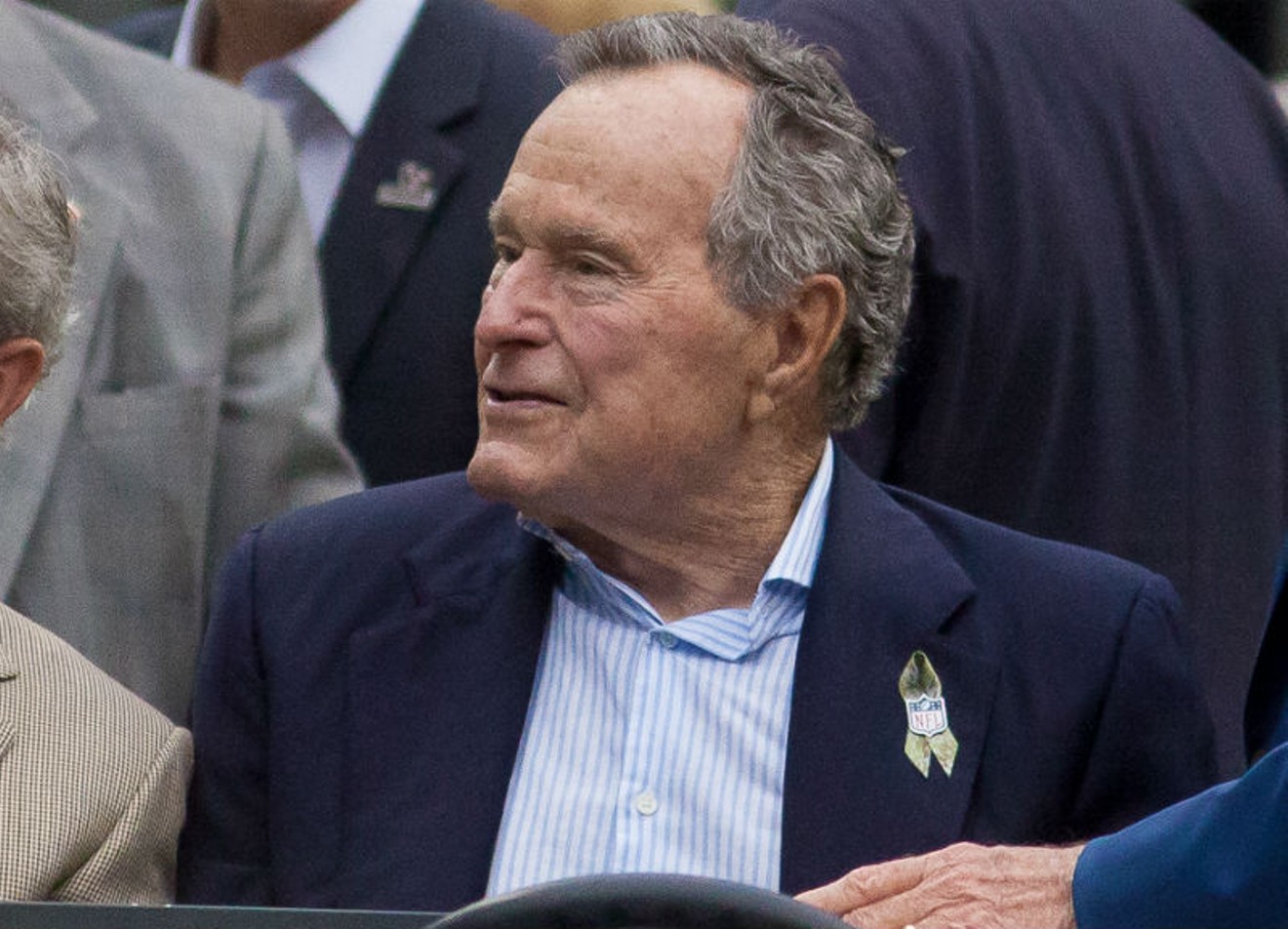Former President George Herbert Walker Bush died Friday night in Houston, the city where years before he began his political career. His death follows that of his wife Barbara who died in April. He was 94 years old.
Accolades poured in almost immediately. Mayor Sylvester Turner pointed out both what the city had meant to the Bushes and what their efforts meant to our area.
“In statesman-like fashion, he knew the importance of reaching across the aisle to find common ground. He backed our bid to host the 2020 Democratic National Convention. He was an equal ally of former election foe President Bill Clinton in helping victims of Hurricane Harvey and Hurricane Irma through the One America Appeal. And I will always be grateful to the Bushes for being kind friends and advisers to me," Turner said.
Texas Governor Greg Abbott also released a statement, saying "The state of Texas mourns with the nation at the passing of one of our greatest Presidents. George H.W. Bush was an American hero and icon, he was a friend to all he met, he embodied class and dignity. Texans are genuinely honored that he called the Lone Star State home and we collectively grieve this monumental loss. On behalf of Texas, Cecilia and I offer our thoughts and prayers to the Bush family in their time of need."
Bush was born On June 12, 1924, Milton, Massachusetts to Prescott Bush and Dorothy Walker Bush. As the son of a wealthy politician - the Bush family was the type of old-money-with-a-patrician-profile rich that believed in public service so Prescott served in local political office and eventually became a senator, the beginning of the family habit of running for and holding political office. The family was wealthy and influential at the same time that they were a people who emphasized the importance of winning, and the importance of never ever bragging about how well you did or the fact that you won, as Richard Ben Cramer explained in his book on the 1988 presidential election, What it Takes.
Bush had a fine education at Phillips Academy and he was heading to Yale when the United States was attacked at Pearl Harbor. Instead of going off to college, Bush enlisted as soon as he turned 18 and became a naval aviator (the Air Force was a part of the Navy at this point in U.S. military history).
He acquitted himself pretty well in the war, flying 58 combat missions. During one mission his his aircraft was hit by flak and caught on fire, but Bush continued flying the plane, completed the attack and released his bombs before bailing out. He then sat in a raft for four hours while fighter planes flew over him until he was picked up. He was awarded several medals, including the Distinguished Flying Cross. Bush was the last president to have served in World War II.
After that, Bush married Barbara Pierce and fast-tracked through Yale. Then he packed up his family and moved out to West Texas to get into the oil business.
The move to the Lone Star State came for two reasons. It gave Bush a way to make a lot of money; he was a millionaire before he was 40. It also got him and Barbara out from under the family's immediate gaze.
The couple had six children, including first son and future president George W. Bush. The Bush family lost their eldest daughter, Robin, to leukemia at age 3. Bush started his own company Zapata, and then branched off into politics.
He began his political career in Harris County, as head of the Harris County Republican Party. From there he vaulted to the U.S. House of Representatives, serving two terms. (Bush, the first Republican Congressman from Houston since Reconstruction, helped Terry Hershey and the other early Buffalo Bayou activists save the last green stretch of the river from channelization while he was in Congress.) In 1970 he took his first run at the presidency and was trounced by Nixon. Nixon wrangled Bush the post of U.S. ambassador to the U.N. Over the following decade he held several jobs, becoming chairman of the Republican National Committee and then head of the CIA.
He had gone through life as the guy who made friends, not political contacts, who didn't so much campaign for office as he quietly became the obvious choice for the position, according to Cramer. "Bush had the talent, a genius for friendship," and his approach to politics was about creating a network of old friends. That ability to go along and get along led him to be the guy who would adjust his views to work with whatever was required. He ran as a Goldwater Republican during his first crack at a Senate seat and then as a left-leaning Republican upon his next run at the office.
And all the while he was an entity that many in the new Republican party — the party cobbled together from old school fiscal conservatives and former Democrats who switched sides over Civil Rights laws and integration — didn't quite know what to make of Bush. He was always something of an enigma for the Republican Party, a man who would run to the right if it would help him get elected or slide to the center if he thought that would do the trick.
He was viewed as not conservative enough when he first ran for the GOP presidential nod in 1970 and again in 1979 (losing to Nixon and Reagan respectively) and his whole political character was a general impression of "wimpiness."
Bush was never a man to show a lot of emotion — even when Ford passed him over for the vice presidency a reporter on hand noted that he wasn't showing much emotion about what amounted to a very public one-two punch to the gut. The reporter says, "Mr. Bush, you don't seem to be too upset about this." Bush replies, "Yes, but you can't see what's on the inside."Either way, while Bush himself was reportedly a very emotional man, he kept all of that locked down and away from the public eye. The impression was of a politician who was never quite willing to let the public see his whole self and he could come off as cold and awkward because of his unwillingness to talk.
Finally, in 1988, he sold himself to the American voters as Reagan's successor and won. After spending eight years as vice president, logging more than a million miles flying to state funerals and other appearances all over the world, Bush had been through the Iran-Contra affair. When Reagan was shot and some thought Bush would seize power with both hands, Bush he didn't even sit in the president's chair to make it clear that wasn't the plan.
Bush came to the presidency extremely qualified for the position, but his actual time in the office was a complicated one. In the relatively brief span of time since H.W. left office, his presidency has been viewed as good on foreign policy and weak on the domestic side of things and he famously raised taxes. He was out of office in four years.
Domestically, Bush was president during a recession and he spent most of his time in the White House wrangling with a large budget surplus, low federal income revenue and a Democratically controlled Congress — all of which added up to Bush running very hard just to stay in one place. He had some victories with the Americans with Disabilities Act and the Clean Air Act, but once he finally achieved the office and became the most powerful man in the world in 1988, the talents of Bush showed most clearly in his foreign policy. He wisely chose not to gloat when the Soviet Union collapsed, fearing that the U.S. president running around dancing a jig might provoke the punch-drunk and pride-stricken Soviets to retaliate. He didn't dance on the fall of the Berlin Wall.
At the same time, Bush basically wrote a strongly worded note to the Chinese government in protest to the brutality of Tienanmen Square. He entered into the Persian Storm in Iraq, wherem, unlike his son, unlike his son, he insisted on getting a coalition of support before moving in.
Bush seemed a whole lot comfortable sliding into the elder statesman role, even forging a friendship with President Bill Clinton in time. He was still embroiled in politics, , as his eldest son began his own march to the presidency.
He went skydiving on his 75th, 80th, 85th and 90th birthday, and started wearing some of most colorful and entertaining socks ever to don a politician's feet. He and wife Barbara acted as a witnesses for a same-sex marriage for longtime employees in Maine.







